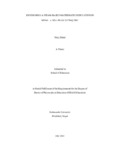
Please use this identifier to cite or link to this item:
https://hdl.handle.net/20.500.14301/523| Title: | Envisioning a STEAM-Based Mathematics Education in Nepal: A Swa-Twam-Tat Inquiry |
| Authors: | Dahal, Niroj |
| Citation: | Dahal, N. (2025).Envisioning a STEAM-based mathematics education in Nepal: A swa-twam-tat inquiry. |
| Issue Date: | Jul-2025 |
| Publisher: | Kathmandu University School of Education |
| School: | SOED |
| Department: | DOSE |
| Level: | Ph.D. |
| Program: | PhD in STEAM Education |
| Abstract: | Based on my experience, mathematics teaching and learning in Nepal rely heavily on standardized, one-size-fits-all approaches that emphasize consistency and adherence to set procedures. These processes can limit opportunities for creativity and critical thinking, and students are guided to memorize formulas and steps without understanding the underlying concepts. While this approach is practical in producing high exam scores, it often leaves students ill-prepared for real-world problem-solving and innovation. My inquiry is guided by an overarching research question: How do contextual and universal perspectives contribute to envisioning the transformative STEAM-based mathematics education in Nepal? This inquiry is grounded in theoretical referents and perspectives of transformative learning theory (Mezirow, 1981, 1991, 2000), knowledge constitutive interests (Habermas, 1972), critical pedagogy (Freire, 1970), curriculum images and metaphors (Schubert, 1986), the Swaraj perspective (Gandhi, 1909), and participatory future studies (Ollenburg, 2019). These theoretical referents and perspectives help me interpret field texts, narratives, voices, reflective notes, and lived experiences of myself as an individual self (Swa), research participants, and a critical friend as a relational selves (Twam), and readers as a universal self (Tat). Subscribing Gyāna Pranāli design space of Bahuprasnavāda, Bahurūpavāda, Bahuarthavāda, and Prājyanvāda within Swa-Twam-Tat inquiry that foregrounds for exploring the experiences of myself (i.e., individual self), four research participants, and a critical friend (i.e., relational selfves), thereby inviting the readers (i.e., universal self). This alternative research methodology integrating the individual self (Swa), relational selves (Twam—research participants and a critical friend), and universal self (Tat—readers) and beyond that involves a reflective journey through the three dimensions of the inquiry: Swa (Self), Twam (Thou), and Tat (That), emphasizing introspection, relational understanding, and non-duality realization. The methodological approaches of this relational inquiry were reflected based on critical reflections among all participants within the iterative nature of reflexivity, grounded in different dimensions and rounds of meta-reflections of diaries, field notes, formal and informal discussions, vignettes, face-to-face discussions, pre- and post-dialogue, short conversations, and reflective writings integration of spiritual wisdom, experiential knowledge, and academic rigor. I considered my inquiry as a transformative process whereby researchers “create community, advance scholarship, and become empowered within a social context” (Chang et al., 2013, p. 36). These processes connected me to further portray the notion of transformative STEAM-based mathematics education in Nepal, intertwining new meanings and visions of STEAM based mathematics education with a sense of self, experiences, and knowledge building for fostering citizenship education. Meaning-making in this inquiry extends beyond field texts and lived experiences but aligns with Ākhyāna writing as the process of inquiry, constructed through interpreting the phenomenon under study and grounded in the philosophical foundations of axiological principles of Dharma (righteousness) and Moksha (liberation), ontological assumption rooted in non-dualism, which posits that the ultimate reality and the individual self are one and the same, and epistemological approach based on intuitive knowledge. Ākhyāna writing as the process of inquiry, I have used dialectical, narrative, metaphorical, poetic, and visual logic and genres (Dahal & Luitel, 2022; Luitel, 2009) considered as a vāda (i.e., debate, discussion, or dialectical method used to explore and establish truth through logical reasoning and evidence). Thus, for meaning-making, I employed a multi-layered inquiry as Ākhyāna analysis of the Swa-Twam-Tat framework. First, I engaged in first-person inquiry (Swa) through journaling, introspection, and autoethnography to reflect on my personal experiences and inner thoughts. Second, I conducted a second-person inquiry (Twam) via interviews and collaborative sharing to explore interpersonal dynamics and collective insights. Finally, I used third-person inquiry (Tat) to examine contexts through ethnography, field research, comparative studies, and document analysis, capturing universal and contextual perspectives. This inclusive approach integrates individual and collective dimensions, offering an inclusive understanding of the field texts, narratives, voices, and reflective notes within the community of ‘I’. I have employed Ākhyāna writing as the process of inquiry in transformative, philosophical, artistic, and performative ways for envisioning STEAM-based mathematics education in/for Nepal, incorporating Swa, Twam, and Tat reflections. In my inquiry, I have portrayed my vision of STEAM-based mathematics education in the context of the relationship between school and school community, engaged pedagogical processes, professional teacher development, leadership development process as reflective leader, and the synergy between local and global knowledge systems for fostering citizenship education incorporating the multidisciplinary, interdisciplinary, and transdisciplinary designs for learning and teaching, integrating technology and incorporating problem- and inquiry-based activities. Furthermore, my vision as a transformative STEAM educator creates a learning environment for learners that nurtures critical thinking, creativity, and problem-solving skills, integrating STEAM disciplines to provide a holistic learning experience for creativity and innovation that leads to citizenship education. My inquiry focuses on bridging the gap between theory and practice as a praxis-driven orientation, promoting interdisciplinary learning, and preparing students to tackle global challenges. Thus, my inquiry illuminates my journey as a STEAM scholar, revealing the reflections and insights gained while envisioning STEAM-based mathematics education. This inquiry strengthens the conceptual, philosophical, and etymological origins intersecting transformative journeys while envisioning STEAM-based mathematics education. |
| URI: | https://hdl.handle.net/20.500.14301/523 |
| Appears in Collections: | Thesis |
Files in This Item:
| File | Description | Size | Format | |
|---|---|---|---|---|
| Envisioning a STEAM-Based Mathematics Education in Nepal--Dahal_PhD--D-Space (1).pdf | 2.64 MB | Adobe PDF |  View/Open |
Items in DSpace are protected by copyright, with all rights reserved, unless otherwise indicated.